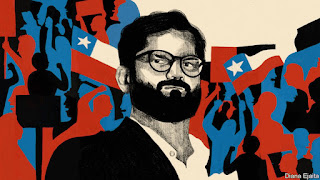Chile Rejects Constitutional Change
Photo source: The Economist
By Naveed Qazi | Editor, Globe Upfront
To find a solution for discontent among the masses, Chile embarked on a risky and courageous path, to rewrite the constitution in order to face myriad challenges. Quite lately, they did in October 2020, but it sadly has been rejected by the masses. It is mainly because maximum of the Chilean voters identify themselves as centrist. Its failure was something extraordinary, as rarely in the modern world has the public rebuffed a constitution-replacement project. It was also a pointer to watchers that Chile, at this moment in time, rejects a plurinational state, as autonomy would have been provided to its indigenous groups.
If the constitution would have been drafted, it would have resulted in one of the most progressive constitutions in the world. According to a Foreign Policy Oped by Catherine Osborne, it would have paved the way for stronger protections for indigenous Chileans, empowered labour unions, given environment-friendly laws, and also almost would have legalised abortion. It would have also upped the ante for the state’s necessities to provide social goods such as health care and housing. As per an article in The Conversation by Christine Bell, the constitutional change was also including an element of direct democracy, gender parity, and a restructuring of the bicameral parliamentary system to give the chamber of deputies (the lower house) more power at the expense of the senate. It would have inserted more than a hundred rights in Chile’s national charter and would have certainly provided a ‘cradle to grave' welfare system. Some laws also sounded odd such as ‘culturally appropriate food’ and ‘digital disconnection to the ruinous.’
As vast majority of centrist voters have been recognised, the new process of constitutional reform may be guided by a centrist set of authors, as Boric’s government believes that the architects of the constitutional change went wrong. Writing for Nueva Sociedad, Titelman reflected that independent and left-wing figures did not care to have a consensus or compromise regarding the matter with more conservative members. Instead, they had opted for maximalist positions. Assembly member Patricio Fernandez, a journalist who ran for the assembly as an independent candidate, made a similar comment to El Mostrador en La Clave Radio. Rosa Catrileo, an indigenous Mapuche assembly member, also cited poor communication as an impediment to the proposed constitution’s approval.
As per an LSE blog, the new set of voters was also the reason for rejection. However, it didn’t stop a section of Chileans to storm the streets of Santiago to celebrate the constitution's rejection. According to BBC, President Boric insisted that he would now work to achieve a ‘text that will incorporate the lessons of the process and win over a broad majority of citizens’. But what is ironic is that Chileans have rejected an attempt to cleanse social and political injustice from their society.
The voters were also disgruntled by the draft’s ‘vagueness’, ‘lengthy nature’ and the ‘legal insecurity’, as per an article by Oliver Stuenkel in Carnegie Endowment. Although, the process created an uncanny environment for the prospective investors, as they were unsure about the prospects of the constitutional referendum. The environment-friendly laws would have certainly put the brakes on the production of Chile’s copper and lithium mining industries.
Before the referendum, political polarisation deepened, since the protests that happened in 2019. During the weeks prior to the plebiscite, fake news flooded social media in Chile, which included false information that the new constitution would allow abortions ‘up to the ninth month of pregnancy’ and would abolish private property. Similar tactics may affect public opinion about the next drafting process, too. According to Marta Lagos of Latinobarometro, a polling organisation, August 2022 was ‘the dirtiest and most violent month of electoral campaigning that Chile has had since 1989.’
Boric, whose coalition includes both centrists and members of the Communist Party, will have to ensure that the topic does not lead to government infighting and more social chaos. The rejection, in fact, is a devastating blow for progressive politics in Chile, which can’t let go off Pinochet’s legacy of a neoliberal constitution. The weakening of Copper prices in Chile is reflective of a recession that would plunge Chile into great griefs. Just six months into his administration, Boric would need sidekicks from elected politicians who didn’t approve of his policies, a tough thing to ask for, in a time where he has failed to curb inflation and rising crime as well.
After the rejection of changes, it is not yet clear how to move forward. In fact, a new constitution can also be directly called. It seems that the rules for the election of the constitutional convention would not be the same as in the previous process, with its structure, number of participants and work period likely set to change.




Comments
Post a Comment
Advice from the Editor: Please refrain from slander, defamation or any kind of libel in the comments section.